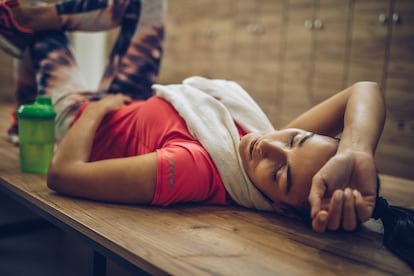Power naps enhance athletic performance, new study shows
A 30 to 60-minute midday snooze boosts physical and cognitive functions and alleviates fatigue, according to research published in the British Journal of Sports Medicine

One of the most cherished summertime indulgences is undoubtedly taking a nap, an activity that embodies the essence of personal time triumphantly conquered, as Spanish author and art history professor Miguel Ángel Hernández wrote in his 2020 book on napping. Beyond the sheer satisfaction they bring, naps also provide many physiological benefits, promote longevity and enhance athletic performance.
Elite athletes may experience partial sleep deprivation due to the stress of competition, jet lag and training at odd hours. Napping can help counteract this sleep deficit and boost sports performance. It improves physical abilities like jumping and sprinting, enhances cognitive functions like reaction time and attention, alleviates fatigue, shortens physical recovery time, and combats the adverse effects of sleep loss on performance.
A recent study published in the respected British Journal of Sports Medicine analyzed evidence from 22 studies involving nearly 300 male athletes aged 18 to 35. The study’s findings indicated that athletes who took naps between 12:30 p.m. and 4:50 p.m. experienced improved cognitive and physical performance, assuming they slept normally at night.
Athletes experiencing partial sleep deprivation also confirmed the positive effects of napping after lunch. Naps of 30 to 60 minutes yield greater benefits compared to longer naps. To prevent the decline of these benefits caused by sleep inertia or grogginess, it’s best to wait about an hour after waking up before exercising. It is worth noting that there are few studies on sleep-deprived individuals, so a definite recommendation on compensating for decline in athletic performance cannot be made. These findings are applicable to physically active or athletic young men aged 18 to 35, so extrapolating the study’s results to other populations should be done cautiously.
The British Journal of Sports Medicine also published a study in 2021 with expert recommendations on the sleep habits of athletes. They suggested power naps when time is short and to avoid the grogginess that comes from waking up from deeper sleep. The study recommended short-duration naps of 15 to 20 minutes immediately after drinking coffee and before noon.
To wake up feeling more refreshed after a nap, it’s a good idea to expose yourself to bright light and wash your face. Relaxation and breathing techniques can help you fall asleep. When deciding how long to nap, consider the time it takes for you to fall asleep and set an alarm for approximately 10 minutes longer than the planned nap.
In the field of sports sciences, there is a recognized need to better understand the effects of napping on athletic performance. However, for those who aren’t world-class athletes, a good nap during the summer will not negatively affect health or sports performance. In fact, it may have a positive impact. Just consider two key factors: sleep inertia and the impact of napping on nighttime sleep.
Sleep inertia is the temporary decline in cognitive performance and alertness that occurs shortly after awakening. It usually lasts 15 to 20 minutes, but can linger for up to two hours. This is why it’s important to allow enough time (at least 30 minutes) for the grogginess to disappear before athletic training or competition.
Taking a nap may affect your nighttime sleep. This depends on different factors such as nap duration, timing and any sleep debt carried over from previous days. Taking longer naps increases the likelihood of reducing sleepiness and the best time is between 1:00 p.m. and 4:00 p.m., which aligns with the drowsy phase of the circadian rhythm and helps prevent delaying the start of nighttime sleep.
Sign up for our weekly newsletter to get more English-language news coverage from EL PAÍS USA Edition
Tu suscripción se está usando en otro dispositivo
¿Quieres añadir otro usuario a tu suscripción?
Si continúas leyendo en este dispositivo, no se podrá leer en el otro.
FlechaTu suscripción se está usando en otro dispositivo y solo puedes acceder a EL PAÍS desde un dispositivo a la vez.
Si quieres compartir tu cuenta, cambia tu suscripción a la modalidad Premium, así podrás añadir otro usuario. Cada uno accederá con su propia cuenta de email, lo que os permitirá personalizar vuestra experiencia en EL PAÍS.
¿Tienes una suscripción de empresa? Accede aquí para contratar más cuentas.
En el caso de no saber quién está usando tu cuenta, te recomendamos cambiar tu contraseña aquí.
Si decides continuar compartiendo tu cuenta, este mensaje se mostrará en tu dispositivo y en el de la otra persona que está usando tu cuenta de forma indefinida, afectando a tu experiencia de lectura. Puedes consultar aquí los términos y condiciones de la suscripción digital.









































